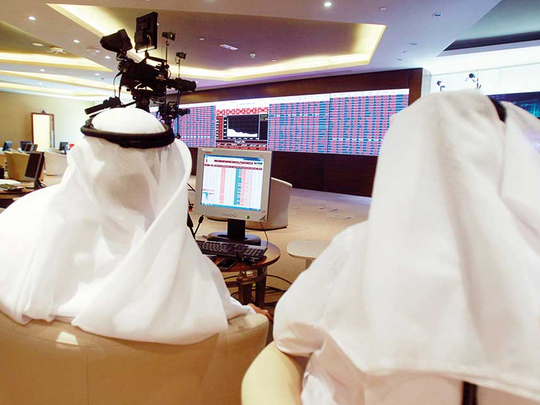
Dubai: The political tensions brewing in the Gulf spilled on equity markets as Qatar index fell as much as 8.2 per cent on Monday, leading regional declines. Dubai and Saudi Arabia’s stocks, however, recovered from early lows.
Saudi Arabia along with the United Arab Emirates and Bahrain severed all diplomatic ties with Qatar on Monday, in an unprecedented move that caught stock market traders by surprise.
The Qatar exchange index fell as much as 9,108.30 or 8.2 per cent, before closing 7.27 per cent lower at 9,202.62. Traded volume was at 20 million shares, the highest since November 2016. According to Bloomberg, Qatar stocks dropped most since 2009.
“The sell-off in Qatar is a panic reaction to the moves, and I think it’s justified in my opinion until we have more clarifications on what is included in this (rift) commercially,” Nadi Bargouti, managing director head of asset management at Emirates Investment Bank, told Gulf News. “If there was panic without any reason, we would be buyers.”
Bargouti expects more downside in Qatari stocks even as the gauge wiped off all the gains it made in the past year. The index registered an 11 per cent decline so far in the year.
“Investors have no incentive to hold any Qatari names, whether stocks or bonds, until they know what future holds for that economy. What we saw today [Monday] could just be the beginning of more things to come,” Bargouti added.
All the 44 stocks on the Qatar bourse closed in the negative. Stocks like Mazaya International, Qatar First Bank, General Insurance closed 10 per cent lower. Qatar National Bank closed 6 per cent lower.
Downside limited
However, the downside was limited in Dubai and Saudi stocks. Dubai index recovered from intra-day low after a sharp bounce in Emaar Properties.
“There is less of a panic in the UAE or Saudi, which reflects investor sentiment that the biggest impact economically would be on Qatar and not on the UAE or Saudi,” Bargouti said.
The Dubai Financial Market General Index closed 0.72 per cent lower at 3,317.50, recovering from the low of 3,264.36.
“There was an outpouring of negative sentiment largely from retail swing traders, the small caps did get affected more than the bell-weather stocks, the market did stage a recovery of sorts from intra-day lows,” said Farid Samji, head of asset management at Daman Investments.
Emaar Properties closed 0.98 per cent lower at Dh7.10. Gulf Finance House closed 2.25 per cent lower at Dh2.25. Shuaa Capital closed more than 5 per cent lower at Dh1.43. Saudi Arabia’s Tadawul index closed in positive, at 0.53 per cent higher to be at 6,964.83, after opening in the negative.
The Abu Dhabi Securities Exchange general index closed flat or up 0.03 per cent at 4,484.46.
GCC rift could affect Qatar credit quality via trade, capital flows — Moody’s
Credit rating agency Moody’s Investors Service is concerned that the rift between Qatar and other regional states could have an impact on Qatar’s credit outlook, if trade and capital flows are disrupted, a senior Moody’s analyst told Reuters on Monday. “There’s a high degree of uncertainty. There’s not much clarity on what could resolve this spat between Qatar and other GCC countries,” Mathias Angonin said in Dubai.
“The last tension ended with no credit implications,” he said, referring to a row when Saudi Arabia, the United Arab Emirates and Bahrain withdrew their ambassadors from Qatar in March 2014.
“But this time around blocking sea, air and land (routes) shows a credit-negative escalation. And we’re concerned that could have a credit impact if it disrupts trade and capital flows.”
Late last month, Moody’s downgraded Qatar’s credit rating by one notch to Aa3 from Aa2 with a stable outlook, citing increasing external debt and uncertainty over the sustainability of the country’s growth model over the next few years.
— Reuters












